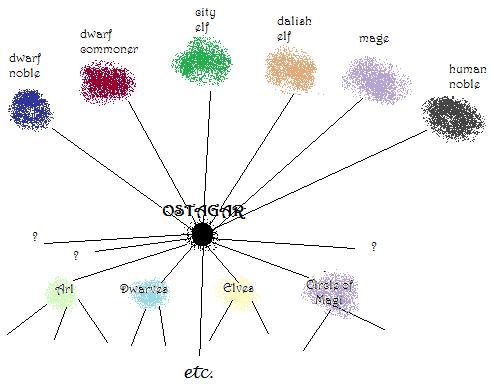As I continue to contemplate the feature of post-primary narrative, I’ve begun to wonder just what place “primary” has in it at all. Of course, there is always a primary. Something must always come first. In games with a multipathed narrative though, what comes first may be different for everyone. I will continue to use Dragon Age: Origins as an example.
There are 6 entry paths available to the narrative in DA:O. These are the “Origins”. However, although there are these finite beginnings, they are able to be colored differently by the players themselves. The dialogue trees in the game offer different perspectives and responses from various game characters. Although in the Origin, the player-character is destined to eventually end up at the same place, they can do so with varied experiences. Rather than 6 individual primary paths, there are actually 6 probability clouds of primary paths. And this is only the Origin. After that, the diagram would get much more complicated.

How then do we analyze a primary narrative experience? Rather than working with traditional methodologies of narrative, we may need to create a theory that acknowledges a model of narrative that has little to no stable text or primary foundation. It can be argued that any text will result in different initial readings depending on the reader, but in those cases, there is a stable text common to all.
In a multipathed narrative like in DA:O, what is common to all? The narrative is a stew of variables rather than a string of constants. There are certain plot points which do occur for everyone, but they still offer multiple avenues of experience through player choice. Although we may all journey to visit Arl Eamon, what actually takes place there at his castle may be quite different for each of us. There are many possible intratextualities and many possible cross-references, but many of them could only come to light in particular post-primary experiences, in which case, the reader’s particular primary experience of the narrative would be greatly influential.
Does this then mean that a single reader could never fully experience the entire narrative? If some post-primary features are dependent on one’s particular primary experience (of which there can only be one, naturally), then a single reader could only experience those which his particular primary allows.
Are his experiences intertextually related to another’s? These are not separate texts that readers experience, and yet, they are different.

Recent Comments